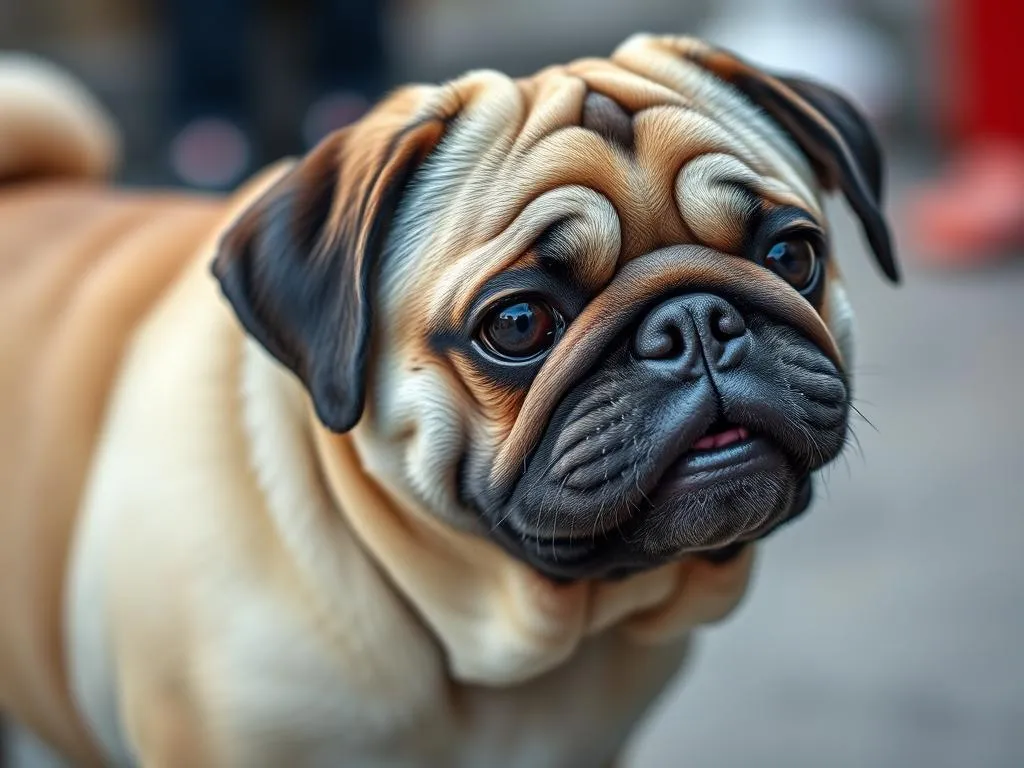
Introduction
Pugs are compact, charming dogs known for their distinctive wrinkled faces and playful personalities. This breed typically weighs between 14 to 18 pounds and stands about 10 to 14 inches tall. With their playful nature, affectionate demeanor, and unique appearance, Pugs have secured a special place in the hearts of dog lovers around the world. Their social and friendly temperament makes them excellent companions for families and individuals alike.
However, not everyone may be able to accommodate a Pug, whether due to lifestyle, space, or specific needs. For those considering bringing a furry friend into their lives, it can be helpful to explore breeds that are similar to Pugs. This article aims to uncover dog breeds that share similar traits with Pugs, including size, temperament, and care requirements.
Understanding the Pug Breed
History of the Pug
The Pug has a rich history, tracing back to ancient China, where they were cherished by royalty. Known as the “Lo-sze,” they were bred as companions to emperors. Over the centuries, Pugs made their way to Europe, where they quickly became popular among the elite. Their affectionate nature and playful spirit have ensured their status as beloved pets to this day.
Physical Characteristics
Pugs are recognizable by their small, stocky bodies, rounded heads, and large, expressive eyes. Their short, smooth coats are typically fawn or black, and they have a distinctive curled tail. With their compact size and charming appearance, Pugs are perfect for apartment living.
Temperament and Behavior
Pugs are known for their playful and sociable nature. They tend to bond closely with their families, making them excellent companions. These dogs are generally friendly with children and other pets, showcasing an affectionate demeanor that endears them to many. However, they do have a stubborn streak, which can require consistent training and patience.
Criteria for Finding Similar Breeds
When searching for breeds that are similar to Pugs, several criteria can help guide your decision.
Size and Build
Pugs are small dogs, and finding breeds of similar size is essential for potential owners. Smaller breeds often have different space requirements and are more suited for apartment living.
Temperament and Energy Level
Pugs are known for their moderate energy levels and friendly disposition. Therefore, looking for breeds with similar behavioral traits can lead to a better match for your lifestyle.
Health Considerations
Pugs are classified as brachycephalic, which means they have short muzzles and flat faces. This can lead to specific health issues, including breathing difficulties and eye problems. Understanding the health concerns of similar breeds is vital for responsible pet ownership.
Breeds Similar to Pugs
French Bulldog
The French Bulldog is a breed that often comes to mind when considering dogs similar to Pugs. They share a compact size, typically weighing between 16 to 28 pounds. French Bulldogs are playful, affectionate, and known for their charming personalities, making them excellent companions. Like Pugs, they are also brachycephalic, which can lead to similar health considerations.
Boston Terrier
The Boston Terrier is another breed that closely resembles Pugs in terms of size and temperament. Weighing between 10 to 25 pounds, Boston Terriers are known for their friendly and lively nature. They are highly adaptable and enjoy spending time with their families, aligning closely with the affectionate behavior exhibited by Pugs.
Cavalier King Charles Spaniel
The Cavalier King Charles Spaniel is a slightly larger breed, typically weighing between 13 to 18 pounds. They are known for their gentle and friendly demeanor. Cavaliers are excellent with families and other pets, making them a suitable alternative for those who appreciate the sociable nature of Pugs. Their moderate energy levels and loving disposition make them a delightful companion.
Shih Tzu
The Shih Tzu is a small breed that shares many traits with Pugs. Weighing between 9 to 16 pounds, Shih Tzus have a similar affectionate and friendly temperament. They require regular grooming due to their long coats, but they thrive on companionship and are known for their playful nature, making them a joy to have around.
Pekingese
The Pekingese is another breed worth considering. Typically weighing between 7 to 14 pounds, they have a unique appearance with a long, flowing coat and a flat face. Pekingese can be a bit more independent than Pugs, but they also exhibit a loving nature and enjoy being around their families. Understanding their specific grooming and care needs is crucial for potential owners.
Other Breeds Worth Considering
English Bulldog
The English Bulldog is a larger breed, weighing between 40 to 50 pounds, but they share a similar brachycephalic structure with Pugs. Known for their calm and friendly temperament, English Bulldogs can be excellent family pets. They tend to be relaxed and do not require excessive exercise, making them suitable for a laid-back lifestyle.
Bichon Frise
The Bichon Frise is a small breed weighing between 12 to 18 pounds, known for their cheerful and playful demeanor. They have a soft, curly coat that requires regular grooming, similar to the Shih Tzu. Bichon Frises are affectionate, friendly, and adapt well to various living situations, making them good alternatives for those considering a Pug.
Dachshund
The Dachshund is a unique breed with a long body and short legs, weighing between 16 to 32 pounds. They are known for their playful and curious nature, often bonding closely with their families. While they may not share the same flat face as Pugs, their friendly demeanor and moderate energy levels make them a suitable option for potential owners.
Tips for Choosing the Right Breed
Assessing Your Lifestyle
Before settling on a breed, consider your lifestyle. Factors such as space, activity level, and family dynamics play a crucial role in choosing the right dog. Understanding your daily routine and how much time you can dedicate to a pet will help you make an informed decision.
Researching Breed Needs
Each breed comes with its own set of grooming, exercise, and health needs. Familiarizing yourself with these requirements is essential for ensuring a happy and healthy relationship with your new dog. Take the time to research each breed thoroughly.
Meeting Breeds Before Deciding
If possible, meet with different breeds before making a decision. Interacting with various dogs can give you a better sense of their temperament and whether they are a good fit for your household.
Conclusion
In summary, there are numerous dog breeds that are similar to Pugs, each with their unique characteristics and needs. From the French Bulldog to the Boston Terrier, potential owners have a variety of options to explore. Understanding the traits and requirements of these breeds is vital in finding a companion that fits your lifestyle.
When considering a new furry friend, it’s essential to prioritize responsible breeding and adoption. Many breeds have rescue organizations dedicated to finding loving homes for dogs in need. By making an informed choice, you can enjoy the companionship of a dog that brings joy and love into your life.
Frequently Asked Questions (FAQs)
Are Pugs good with children?
Yes, Pugs are generally friendly and affectionate, making them suitable companions for children. They enjoy playtime and are known for their playful nature.
What are common health issues in breeds similar to Pugs?
Common health issues in brachycephalic breeds, including Pugs and similar breeds, can include breathing difficulties, eye problems, and skin conditions. Regular veterinary check-ups are vital for monitoring these health concerns.
How do I know if a breed is right for me?
Assess your lifestyle, living situation, and the time you can dedicate to a pet. Research different breeds and meet them in person to gauge compatibility.
What are the grooming needs for these breeds?
Grooming needs can vary among breeds. For example, Shih Tzus and Bichon Frises require regular grooming due to their coats, while Pugs and French Bulldogs have minimal grooming needs.
Are there any rescue organizations for these breeds?
Yes, many rescue organizations focus on specific breeds, including Pugs and similar breeds. Research local shelters and breed-specific rescues to find dogs in need of homes.









